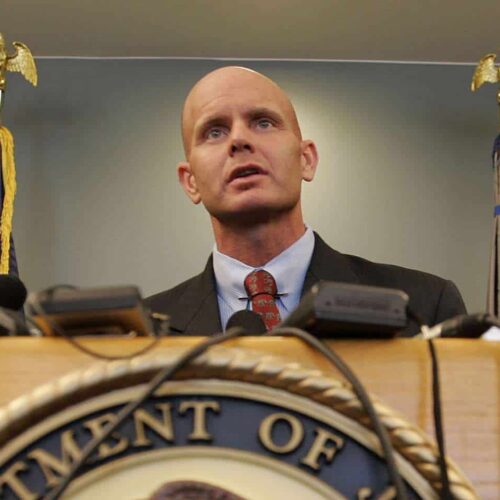Introduction
Fred Humphries does not fit the stereotype of an FBI agent as cool and unemotional. In person, the man who helped initiate the investigation of CIA Director David Petraeus comes across as a passionate and empathetic person.
Until this week, Humphries was best known as the FBI agent who gleaned critical intelligence from an al-Qaida trained bomber in months of interrogations before the World Trade Center attack. Both a federal prosecutor and defense lawyer praised Humphries for the rapport he developed with Ahmed Ressam, the man convicted of a plot to detonate a bomb in the Los Angeles International Airport.
Humphries interrogations are credited with saving lives, most notably in helping authorities defuse the shoe bomb smuggled onto a commercial jet by Richard Reid. But Humphries raised a few eyebrows when he was called by defense lawyers to testify at sentencing that Ressam provided useful information.
Humphries sat down with a reporter from the Center for Public Integrity last year to talk about his personal beliefs opposing the CIA’s enhanced interrogation techniques employed after 9/11. Humphries described torture as both immoral and ineffective.
In the interview, Humphries said brutal techniques only lead to bad information. While he stressed that he does not condone Ressam’s actions, he said the key to getting cooperation was to try to put himself in Ressam’s shoes.
“As an agent, it’s not my position to judge,” he said. “I’m just there to find facts.”
Humphries’s empathy may have worked against him in the Petraeus investigation. Humphries and his wife became friends with Jill Kelley, a socialite who along with her husband hosted events for top military brass in Tampa. Kelley went to Humphries last May when she received suspicious anonymous emails.
The New York Times reports that the emails raised concerns within the FBI that someone might be stalking senior US officials.
Initial stories reported that Humphries had previously sent a shirtless photo to Kelley. But the Seattle Times reports today that Humphries sent the same photo as a joke to dozens of friends in 2010, including a Seattle Times reporter and Humphries’s former boss at the FBI. The Seattle Times reported that the snapshot shows Humphries, muscular and bare-chested, between two equally buff target dummies on a shooting range.
Humphries also sent friends an email after attending a party with Petraeus, in which he described him and another general as “great leaders,” the Seattle Times reported.
It’s not clear if Humphries realized that the investigation might lead to Petraeus’s resignation or raise questions about numerous flirtatious emails between Kelley and Gen. John Allen, top commander in Afghanistan. Other agents in Tampa reportedly kept Humphries out of the investigation because of his intense interest in it. Left out of the loop, Humphries reportedly feared that the case was being blocked politically. So late last month he went to Congressman Dave Reichert, R-Wa., a former sheriff in Seattle where Humphries had been stationed. News that Humphries went to members of Congress got back to the FBI director.
Within days, the FBI briefed James Clapper, Director of National Intelligence, about its probe. He persuaded Petraeus to resign.
Read more in National Security
National Security
The year in national security coverage
National Security
After Sandy Hook shootings, NRA campaign clout still formidable
Organization spends millions defending its interests, but may briefly be on defensive in wake of shooting


Join the conversation
Show Comments